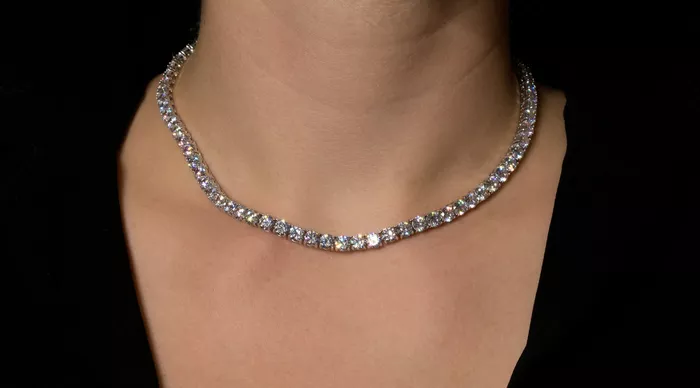Tennis chains have become a popular accessory in the realm of jewelry, known for their timeless elegance and versatility. However, as with any coveted item, the market is flooded with replicas and counterfeits. For those seeking authenticity, distinguishing between genuine tennis chains and imitations is crucial. In this comprehensive guide, we delve into the intricacies of identifying a real tennis chain, providing valuable insights and practical tips for consumers.
Understanding Tennis Chains:
Before delving into the nuances of authenticity, it’s essential to grasp what constitutes a tennis chain. Originating from the world of tennis, these chains are characterized by a continuous line of uniformly sized diamonds or gemstones set in a precious metal such as gold, silver, or platinum. The stones are typically held in place by prongs or channels, creating a seamless and dazzling display of brilliance.
Materials Matter:
One of the primary indicators of a genuine tennis chain lies in the materials used in its construction. Authentic tennis chains are crafted from high-quality metals and genuine gemstones, reflecting superior craftsmanship and durability. Gold tennis chains, for instance, are often made from 14K or 18K gold, stamped with corresponding hallmarks as a testament to their purity. Similarly, authentic diamond tennis chains feature diamonds that adhere to strict standards of clarity, cut, color, and carat weight.
Examine the Clarity and Color of Gemstones:
A telltale sign of authenticity lies in the clarity and color of the gemstones adorning the tennis chain. Genuine diamonds exhibit exceptional clarity, devoid of any visible flaws or inclusions when examined under magnification. Furthermore, authentic diamonds display a brilliant white hue, with minimal presence of yellow or brown undertones. Conversely, counterfeit tennis chains often feature lower-quality gemstones with noticeable imperfections and inferior color saturation.
Assess the Setting and Craftsmanship:
The setting of the gemstones and overall craftsmanship of the tennis chain offer valuable insights into its authenticity. Authentic tennis chains boast precision-set stones, with each diamond or gemstone securely held in place without any signs of looseness or misalignment. Pay close attention to the prongs or channels holding the stones, ensuring they are uniform in size, shape, and spacing. Additionally, examine the metalwork for signs of superior craftsmanship, such as smooth edges, seamless joins, and a polished finish.
Verify Hallmarks and Certifications:
When purchasing a tennis chain, always verify the presence of hallmarks and certifications that attest to its authenticity. Genuine gold tennis chains should bear hallmarks indicating the purity of the metal, such as “14K” or “18K” for gold, along with the manufacturer’s trademark. Similarly, reputable diamond tennis chains often come with certifications from recognized gemological laboratories such as the Gemological Institute of America (GIA) or the International Gemological Institute (IGI). These certificates provide detailed information about the diamonds’ quality and authenticity, offering peace of mind to consumers.
Seek Reputable Sellers and Brands:
One of the most effective ways to ensure the authenticity of a tennis chain is to purchase from reputable sellers and established brands with a track record of excellence. Reputable jewelers and luxury retailers prioritize quality and authenticity, offering genuine tennis chains backed by warranties and return policies. Avoid purchasing from unfamiliar or dubious sources, especially online marketplaces where counterfeit goods abound. Instead, opt for authorized retailers and trusted platforms known for their commitment to authenticity and customer satisfaction.
Utilize Professional Appraisal Services:
For added assurance, consider utilizing professional appraisal services to verify the authenticity and value of a tennis chain. Certified gemologists and appraisers possess the expertise and tools necessary to assess the quality of gemstones, metals, and craftsmanship with precision. Through thorough examination and testing, they can provide a comprehensive evaluation of the tennis chain, including its authenticity, purity, and market value. While appraisal services may incur additional costs, they offer invaluable insights and peace of mind, especially when making significant investments in luxury jewelry.
Conclusion:
In the realm of jewelry, authenticity is paramount, particularly when it comes to coveted pieces like tennis chains. By familiarizing yourself with the hallmarks of authenticity and employing diligent scrutiny, you can confidently discern between genuine tennis chains and counterfeit imitations. Remember to prioritize reputable sellers, verify certifications, and seek professional appraisal when in doubt. With these insights and precautions, you can adorn yourself with a genuine tennis chain that epitomizes elegance, sophistication, and enduring quality.
FAQs
What materials are authentic tennis chains made of?
Authentic tennis chains are typically made from high-quality metals such as 14K or 18K gold, sterling silver, or platinum. The choice of metal depends on personal preference and budget, with gold being the most common option. Additionally, genuine tennis chains feature diamonds or gemstones that meet strict standards of quality, clarity, and color.
What should I look for in the clarity and color of gemstones on a tennis chain?
When assessing the clarity and color of gemstones on a tennis chain, look for diamonds or gemstones that exhibit exceptional clarity, free from visible flaws or inclusions when examined under magnification. Genuine diamonds display a brilliant white hue with minimal presence of yellow or brown undertones. Avoid tennis chains with gemstones that have noticeable imperfections or inferior color saturation, as these may indicate counterfeit or lower-quality materials.
Are there any specific hallmarks or certifications I should look for when purchasing a tennis chain?
Yes, when purchasing a tennis chain, look for hallmarks that indicate the purity of the metal, such as “14K” or “18K” for gold, along with the manufacturer’s trademark. Additionally, reputable diamond tennis chains often come with certifications from recognized gemological laboratories such as the Gemological Institute of America (GIA) or the International Gemological Institute (IGI). These certifications provide detailed information about the diamonds’ quality and authenticity, offering peace of mind to consumers.

